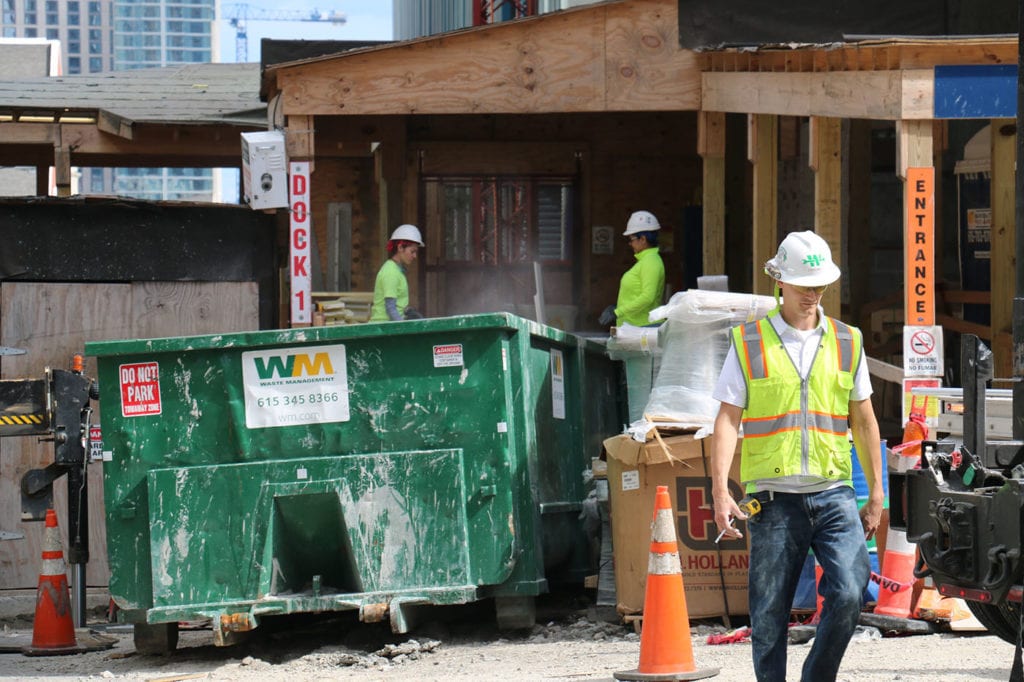By Peter White
NASHVILLE, TN — Nashville is home to two kinds of people: those who can afford to live here and those who can’t.
“We want to make sure that high roll contractors are paying workers a living wage so that at the end of day they can continue to live in the city,” said Vonda McDaniel, President of the Nashville Central Labor Council.
McDaniel and members of a group called Workers’ Dignity gathered on the steps of the Downtown Presbyterian Church last week to present the findings of a new study documenting unsafe working conditions and wage theft in six southern cities, including Nashville.
The “Build a Better South” study by University of Illinois in Chicago paints a bleak picture of the construction industry. Researchers interviewed 1,435 construction workers and Nashville had the highest injury rate. One in four workers were injured on the job last year in Nashville. The average rate in Atlanta, Charlotte, Dallas, Houston, and Miami was one in seven.
“We want safe conditions for everybody and there is no reason why construction workers should be any less,” said Rigo Robles of Workers’ Dignity.
Among the study’s findings:
• Just 5 percent of workers who were injured in the past 12 months had workers’ compensation insurance to cover their medical expenses.
• Few construction workers have access to basic employment benefits. Less than half (43 percent) of construction workers are offered medical insurance by their employer.
• The problem of access to medical insurance is exacerbated by the fact that only 45 percent have an employer that has workers’ compensation insurance. Although many work fulltime, many construction workers are hired through temp agencies that pay $3/hr. less and hire them as independent contractors.
• Thirty-six percent of workers struggle to pay for basic necessities, such as rent or food, even though 82 percent of workers reported working overtime with their current employer.
• Approximately three out of four workers lack paid personal time (73 percent) or paid sick time (78 percent). More than half (57 percent) of workers surveyed earn less than $15 per hour despite high average levels of experience in the industry.
• Thirty percent of the surveyed workers were not paid for overtime. The amount of unpaid wages in the six cities studied is estimated to be $29.8 million, an average of $1,604 per worker in 2016. The median amount was $800, more than a week’s wage for the average worker. More than half of the workers in the study asked their employer for what they were owed but 62% never got their unpaid wages.
“Many of these developers are relying pretty heavily on subsidies that they are receiving from the Metro Council and that is irresponsible because this is tax payer funds that are going to the exploitation of workers,” said Jackie Cornejo, co-author of the report.
The median value of a house in Nashville is $225,000. The median price of listed homes in Nashville is $335,990; the median rent is $1, 650, according to the Zillow Home Value Index.
The average wage for construction work in Nashville is about $15/hr., $600 per week, or about $30,000 a year. Construction workers in Nashville cannot afford to buy the houses they build. They would pay 68% of their income just to rent one.
Anything over 30% of monthly income is unaffordable according to the federal Housing and Urban Development agency.
“We need to minimize the dangers and make sure the workers are safe and they can make a decent living doing it,” said District 31 Councilman Fabian Bedne.
“We’ve been having these conversations for years and there has been a lot of momentum building up to this moment. The time to act is now,” said Councilman Anthony Davis.
“Its time to finish the conversation and come up with something that we can actually pass in the council. We are bound by state law but there is space for us to act locally. and that’ what we want to do,” added Bedne.
As a blue enclave in a red state, city leaders in Nashville face tough challenges to create affordable housing, good paying jobs, and enforce labor laws without falling afoul of private property rights and the state’s right to work laws.
For example, Metro Council passed an ordinance in September of 2016 that required set asides for affordable housing but a state law prohibits local governments from enacting affordable housing mandates as they relate to rental properties.
Within a couple of months, Bedne said he would present a concept to the council’s lawyer so he could evaluate it before presenting any legislation to the city council.
“We are this stage now,” Bedne said. “We know what we want, it’s coming up with a draft of a first legislation that can be shared with Nashville and then start getting the feedback,” he said.


